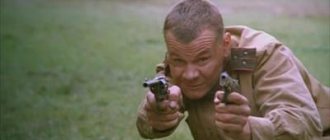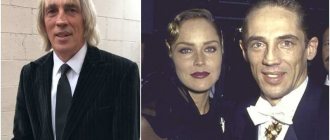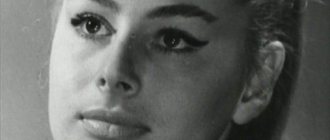Biography
The future celebrity was born in 1973 in Rzhev. The girl's talent for music was discovered in childhood. This contributed to the fact that Inna’s family decided to actively develop them, so she actively took part in various school events and attended a music school.
At the same time, the teachers at that time were amazed by her bright talent and made a lot of efforts to develop it. To this end, they gave Inna lessons in which they taught her all sorts of details in singing, for example, the ability to control her timbre and intonation.
The efforts of the teachers were not in vain, since Inna Razumikhina’s creative biography began back in 1991, when she took part in the All-Union Competition for Young Artists and rightfully received a prize there.
Alla Boyanova
The girl received her education at the Gnessin Music College, which she graduated in 1995. Her creative activity was significantly influenced by the work of Marina Tsvetaeva, as well as her acquaintance with the singer Alla Boyanova, who was so amazed by Inna’s abilities that she gave her several of her romances.
Career
For many who are interested in learning about the biography and personal life of Inna Razumikhina, the real discovery is that the woman never put her career in the foreground. She always considered family and having children a priority. However, Inna’s fate was such that she became an outstanding singer with an army of loyal fans.
Razumikhina showed herself in such original creative directions as new retro and acting chanson. By her own admission, she realized that it was not in vain that she dedicated her life to the stage at the moment when she won the “Hope of Russia” award, considered one of the most prestigious in the country.
With her singing, Inna is able to convey a whole range of emotions, thanks to which she received the recognition and love of fans. She is characterized by a special and unique manner of performance. Thus, a woman often begins her performances by reading poetry, and then gradually switches to singing. All of Inna’s works are filled with deep meaning; they make listeners think about important moments in life.
In the photos from the singer’s concerts you can see how much she devotes herself to her work and puts her soul into it.
Razumikhina also proved herself in cinema; she was invited to voice roles in some films. Among them we can list such as “Hero of Our Time”, “My Prechistenka”, “Palace Secrets”.
Interesting: Boris Galkin: biography, personal life, wife, photo
Biography of singer Inna Razumikhina and her personal life
Home Biography
Singer Inna Razumikhina has been familiar to Russian listeners since the early 90s. She has many years of successful concert experience and a rich track record, including awards and titles at prestigious Russian vocal competitions: Romansiada, Actor's Song. A. Mironov”, “Song of Russia”, etc.
For a number of years, Inna worked as a leading artist of the Theater of Music and Poetry under the direction of Elena Kamburova, taking part in all productions of the theater. However, in 2001, feeling an irresistible creative impulse, she took up a solo career, and this brought her genuine success and recognition from domestic listeners.
The geography of her performances covers many regions of Russia. She performs at the Moscow International House of Music, GKZCH named after. P.I. Tchaikovsky, in philharmonic societies and in cinema and concert halls of the country. One thing unites all of Inna Razumikhina’s performances: there are no indifferent listeners left in the hall!
Honed vocal and dramatic skills, a unique timbre of her voice, the penetration of intonation, a subtle sense of style, as well as the spontaneity and sincerity, charm and freshness of her performance, her inherent special charisma and energy of emotional impact on the public - all this helps to establish an atmosphere of trust and empathy in the audience. hall
Of particular note is the singer’s approach to the formation of her repertoire. First of all, she is guided by considerations of strict artistic, musical and poetic taste. That is why there are no so-called “common places” in her programs. Through each song and romance, she directly addresses the soul of every listener and viewer, excites, asks questions, surprises with unexpected eccentricity and touches to tears with the spontaneity of experience and the poignancy of the artistic image. Often at the end of the performance the audience gives a standing ovation to the singer.
Inna Razumikhina's repertoire extends from ancient Russian and gypsy romance to modern lyrical pop, including French chanson, which is especially loved by the audience in Russia. Depending on the creative need, a guitar, accordion and other musical instruments join the piano on stage.
Songs performed by Inna can also be heard in Russian cinema. She is a regular participant in the “Stars of Russian Romance” concert project. Over the past ten years, the singer has recorded three solo albums, two albums in partnership with actor Boris Plotnikov and counter tenor Eric Kurmangaliev, and three collections with the masters of Russian romance Nani Bregvadze, Leonid Serebryannikov, Valentina Ponomareva, Vladimir Devyatov.
Quotes from publications:
“Rossiyskaya Gazeta”, Moscow No. 6337 dated March 21, 2014 “Her voice is recognizable. Today, in times of computer modulation and one-to-one performances, this is a real rarity. Moreover, we recognize not only the voice, dramatic, sensual, flexible, but also the repertoire - poems by Akhmatova, Voloshin, Brodsky, Tsvetaeva, Okudzhava set to music.”
“Your New Day” Yoshkar-Ola, April 24, 2010. “April 16 at the Mari National Drama Theater named after. M. Shketan hosted an evening of Russian romance and French chanson performed by Moscow singer Inna Razumikhina. The singer’s bewitching voice, bright originality, and penetrating emotionality left a deep impression. Even after a few days, memories, dissolved in everyday life, will suddenly be illuminated by a flashing thought: this is true art!”
“Northern Worker”, May 5, 2009 “...The singer showed a voice rich in intonations, artistry, and good taste. I was very pleased with the second part, where Inna performed songs in French from the repertoire of the great Edith Piaf and other singers.”
"Culture News. Perm" No. 11 (71) 2009 "... The concerts of young singers Irina Krutova and Inna Razumikhina, performers with great creative merits, who visited Perm for the first time, stood out. The full houses at their concerts were fueled not only by curiosity - what is hidden behind the titles and titles? – but also interesting programs. Inna Razumikhina confirmed with her performance that long-known romances can suddenly sound unexpected, fresh and original. It’s amazing how the juxtaposition of Russian romance and French song in one program turned out to be non-eclectic and even close in aesthetics.”
1991 – prize-winner of the All-Union Competition of Young Performers “Yalta-91”.
1994–1996 - artist of the State Moscow Theater "Impromt" under the direction of Lyudmila Ivanova.
1995 – diploma and audience award at the International Actor's Song Contest
them. A. Mironova.
1995–2001 - artist of the Moscow Theater of Music and Poetry under the direction of Elena Kamburova.
1996 – laureate of the author’s song competition named after. V. Vysotsky.
1997 – diploma and “Hope of Russia” prize for a careful and modern reading of Russian romance at the All-Russian competition “Romansiada”.
1997 – diploma winner of the All-Russian television pop song competition “Song of Russia”.
1998 – diploma winner of the IV All-Russian Yesenin Competition of Young Composers “Rowan Clusters”.
Works in cinema:
1997 - the role of Sonya Goliday in the television film “Prayers from Other Places”, dir. M. Trofimov
(based on the work of M. Tsvetaeva “The Tale of Sonechka”).
1997 - songs for the television film “I Listen to the Wind”, dir. M. Trofimov.
2001-2003 - songs for the television film “Palace Secrets”, dir. M. Trofimov.
2002 - songs for the film “The Romance of Her Soul”, dir. T. Malova.
2004 - songs for the film “Only Once...”, dir. A. Surikova.
2004 - songs for the film “My Prechistenka”, dir. L. Gladunko, B. Tokarev.
2005 - Mary’s song for the film “A Hero of Our Time”, dir. A. Cott.
2008 - songs for the television film “Splash of Champagne”, dir. M. Trofimov.
Personal life
Like any other representative of the fair sex, the singer always wanted to find female happiness. Little is known about the personal life of Inna Razumikhina before Galkin; it was the meeting with him that became fateful for the celebrity.
Inna Razumikhina and Boris Galkin
At the time they met, Boris was married, but Inna became true love at first sight for him. A fateful meeting took place in the city of Bryansk at a concert. Many fans are interested in how many years Boris Galkin’s wife Inna Razumikhina is younger than him. The age difference between them is 25 years, but this did not stop them from falling in love with each other. Some fans did not approve of Inna’s choice, given that Boris had already been married twice.
However, despite everything, the couple is very happy. They are connected by a bright creative tandem; many viewers appreciated their joint performances, which began in 2013.
Together with her husband, Inna found her happiness, and in 2020 they had a girl, Anya. Razumikhina’s pregnancy was not easy; she gave birth ahead of schedule.
Inna Razumikhina with her husband and daughter
As the celebrities subsequently reported in their interviews, they had previously wanted to have a child, but Inna’s pregnancies were interrupted due to miscarriages. In the case of her daughter, she hid until the last the fact that she was carrying her, even wearing clothes that were a couple of sizes larger.
Excerpt characterizing Razumikhin, Inna Viktorovna
On August 25, on the eve of the Battle of Borodino, the prefect of the palace of the French Emperor, Mr. de Beausset, and Colonel Fabvier arrived, the first from Paris, the second from Madrid, to Emperor Napoleon in his camp at Valuev. Having changed into a court uniform, Mr. de Beausset ordered the parcel he had brought to the emperor to be carried in front of him and entered the first compartment of Napoleon's tent, where, talking with Napoleon's adjutants who surrounded him, he began to uncork the box. Fabvier, without entering the tent, stopped, talking with familiar generals, at the entrance to it. Emperor Napoleon had not yet left his bedroom and was finishing his toilet. He, snorting and grunting, turned first with his thick back, then with his overgrown fat chest under the brush with which the valet rubbed his body. Another valet, holding the bottle with his finger, sprinkled cologne on the emperor’s well-groomed body with an expression that said that he alone could know how much and where to spray the cologne. Napoleon's short hair was wet and tangled over his forehead. But his face, although swollen and yellow, expressed physical pleasure: “Allez ferme, allez toujours...” [Well, even stronger...] - he said, shrugging and grunting, to the valet who was rubbing him. The adjutant, who entered the bedroom in order to report to the emperor about how many prisoners were taken in yesterday's case, having handed over what was needed, stood at the door, waiting for permission to leave. Napoleon, wincing, glanced from under his brows at the adjutant. “Point de prisonniers,” he repeated the adjutant’s words. – Il se font demolir. “Tant pis pour l’armee russe,” he said. – Allez toujours, allez ferme, [No prisoners. They force themselves to be exterminated. So much the worse for the Russian army. Well, even more, well, stronger...] - he said, hunching his back and exposing his fat shoulders. - C'est bien! Faites entrer monsieur de Beausset, ainsi que Fabvier, [Good! Let de Bosset come in, and Fabvier too.] - he said to the adjutant, nodding his head. - Oui, Sire, [I'm listening, sir.] - and the adjutant disappeared through the door of the tent. Two valets quickly dressed His Majesty, and he, in a blue guards uniform, walked out into the reception room with firm, quick steps. At this time, Bosse was hurrying with his hands, placing the gift he had brought from the Empress on two chairs, right in front of the Emperor’s entrance. But the emperor got dressed and went out so unexpectedly quickly that he did not have time to fully prepare the surprise. Napoleon immediately noticed what they were doing and guessed that they were not yet ready. He didn't want to deprive them of the pleasure of surprising him. He pretended not to see Monsieur Bosset and called Fabvier over to him. Napoleon listened, with a stern frown and in silence, to what Fabvier told him about the courage and devotion of his troops, who fought at Salamanca on the other side of Europe and had only one thought - to be worthy of their emperor, and one fear - not to please him. The result of the battle was sad. Napoleon made ironic remarks during Fabvier's story, as if he did not imagine that things could go differently in his absence. “I must correct this in Moscow,” said Napoleon. “A tantot, [Goodbye.],” he added and called de Bosset, who at that time had already managed to prepare a surprise by placing something on the chairs and covering something with a blanket. De Bosset bowed low with that French court bow, which only the old servants of the Bourbons knew how to bow, and approached, handing over an envelope. Napoleon turned to him cheerfully and pulled him by the ear. – You were in a hurry, I’m very glad. Well, what does Paris say? - he said, suddenly changing his previously stern expression to the most affectionate. – Sire, tout Paris regrette votre absence, [Sire, all of Paris regrets your absence.] – as it should, answered de Bosset. But although Napoleon knew that Bosset had to say this or the like, although he knew in his clear moments that it was not true, he was pleased to hear it from de Bosset. He again deigned to touch him behind the ear. “Je suis fache, de vous avoir fait faire tant de chemin,” he said. - Sire! Je ne m'attendais pas a moins qu'a vous trouver aux portes de Moscou, [I expected no less than to find you, sir, at the gates of Moscow.] - said Bosset. Napoleon smiled and, absentmindedly raising his head, looked around to the right. The adjutant approached with a floating step with a golden snuff-box and offered it to her. Napoleon took it. “Yes, it happened well for you,” he said, putting the open snuffbox to his nose, “you love to travel, in three days you will see Moscow.” You probably didn’t expect to see the Asian capital. You will make a pleasant trip. Bosse bowed with gratitude for this attentiveness to his (until now unknown to him) inclination to travel. - A! what's this? - said Napoleon, noticing that all the courtiers were looking at something covered with a veil. Bosse, with courtly dexterity, without showing his back, took a half-turn two steps back and at the same time pulled off the coverlet and said: “A gift to your Majesty from the Empress.” It was a portrait painted by Gerard in bright colors of a boy born from Napoleon and the daughter of the Austrian emperor, whom for some reason everyone called the King of Rome. A very handsome curly-haired boy, with a look similar to that of Christ in the Sistine Madonna, was depicted playing in a billbok. The ball represented the globe, and the wand in the other hand represented the scepter. Although it was not entirely clear what exactly the painter wanted to express by representing the so-called King of Rome piercing the globe with a stick, this allegory, like everyone who saw the picture in Paris, and Napoleon, obviously seemed clear and liked it very much. “Roi de Rome, [Roman King.],” he said, pointing to the portrait with a graceful gesture of his hand. – Admirable! [Wonderful!] – With the Italian ability to change his facial expression at will, he approached the portrait and pretended to be thoughtfully tender. He felt that what he would say and do now was history. And it seemed to him that the best thing he could do now is that he, with his greatness, as a result of which his son played with the globe in a bilbok, should show, in contrast to this greatness, the simplest fatherly tenderness. His eyes became misty, he moved, looked back at the chair (the chair jumped under him) and sat down on it opposite the portrait. One gesture from him - and everyone tiptoed out, leaving the great man to himself and his feelings. After sitting for some time and touching, without knowing why, his hand to the roughness of the glare of the portrait, he stood up and again called Bosse and the duty officer. He ordered the portrait to be taken out in front of the tent, so as not to deprive the old guard, who stood near his tent, of the happiness of seeing the Roman king, the son and heir of their beloved sovereign. As he had expected, while he was having breakfast with Monsieur Bosse, who had received this honor, in front of the tent the enthusiastic cries of the officers and soldiers of the old guard who had come running to the portrait were heard. – Vive l'Empereur! Vive le Roi de Rome! Vive l'Empereur! [Long live the Emperor! Long live the Roman King!] - enthusiastic voices were heard. After breakfast, Napoleon, in the presence of Bosse, dictated his orders for the army. – Courte et energique! [Short and energetic!] - said Napoleon when he read the written proclamation immediately without amendments. The order was: “Warriors! This is the battle you have longed for. Victory depends on you. It is necessary for us; she will provide us with everything we need: comfortable apartments and a quick return to our homeland. Act as you acted at Austerlitz, Friedland, Vitebsk and Smolensk. May later posterity proudly remember your exploits to this day. Let it be said about each of you: he was in the great battle near Moscow!” – De la Moscow! [Near Moscow!] - Napoleon repeated, and, inviting Mr. Bosset, who loved to travel, to join him in his walk, he left the tent to the saddled horses. “Votre Majeste a trop de bonte, [You are too kind, Your Majesty," Bosse said when asked to accompany the emperor: he was sleepy and did not know how and was afraid to ride a horse. But Napoleon nodded to the traveler, and Bosse had to go. When Napoleon left the tent, the screams of the guards in front of the portrait of his son intensified even more. Napoleon frowned. “Take it off,” he said, pointing to the portrait with a graceful, majestic gesture. “It’s too early for him to see the battlefield.” Bosse, closing his eyes and bowing his head, took a deep breath, with this gesture showing how he knew how to appreciate and understand the words of the emperor. Napoleon spent the entire day of August 25, as his historians say, on horseback, inspecting the area, discussing the plans presented to him by his marshals, and personally giving orders to his generals.
Interesting Facts
Before meeting Inna Razumikhina, Galkin was married to Elena Demidova, with whom two children were born. Son Vladislav became a popular actor, who, unfortunately, died at a fairly young age. Boris cannot forgive himself for this fact to this day, believing that he did not look after his son. Daughter Maria has autism and lives in the village.
Interesting: Vlad Galkin: biography, personal life
Works in cinema[ | ]
- 1997 - the role of Sonya Goliday in the television film “Prayers from Other Places”, dir. M. Trofimov (based on the work of M. Tsvetaeva “The Tale of Sonechka”).
- 1997 - songs for the television film “I Listen to the Wind”, dir. M. Trofimov.
- 2001-2003 - songs for the television film “Palace Secrets”, dir. M. Trofimov.
- 2002 - songs for the film “The Romance of Her Soul”, dir. T. Malova.
- 2004 - songs for the film “Only Once...”, dir. A. Surikova.
- 2004 - songs for the film “My Prechistenka”, dir. L. Gladunko, B. Tokarev.
- 2005 - Mary’s song for the film “A Hero of Our Time”, dir. A. Cott.
- 2008 - songs for the television film “Splash of Champagne”, dir. M. Trofimov.
Inna Razumikhina now
The star couple pays great attention to raising their daughter. Both Inna and Boris believe that this is the meaning of their lives. Currently, Razumikhina is on sabbatical in order to pay due attention to the development and upbringing of her daughter.
Fans who are interested in the biography, personal life and children of Inna Razumikhina can fully rejoice for their idol. She succeeded both as a bright, talented singer and as a loving mother.











